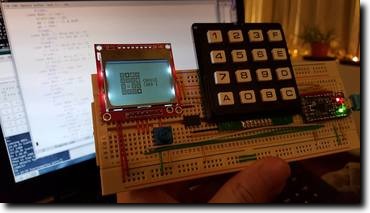Posts tagged avr
Rust on AVR: Beyond Blinking
12 May 2017 (programming rust llvm electronics avr chip-8)In February this year, Dylan McKay wrote in his blog:
In the coming months the Rust compiler should support AVR support out-of-the-box!
I've been watching this from afar, planning to try it out when AVR support is mainlined into Rust; I thought it would be much easier to wait until the dust settles than trying to track the development versions of LLVM and Rust at the same time. However, it's now May, LLVM 4.0 has come out with the new AVR backend and the Rust compiler has been updated to use it; and my interest in Rust has also started to grow: in late March one of my beachside readings on Gili Meno was O'Reilly's Programming Rust, and a Rust meetup group started in Singapore. And so I started to formulate a plan.
Two years ago, Viki and I designed and prototyped a very minimal AVR-based handheld console that can run CHIP-8 programs. It's made up of an Adafruit Trinket (an AVR ATMega328P running on 12MHz@3.3V, with a bit of circuitry to be programmable via serial-over-USB), a serial SRAM chip, an LCD from an old Nokia phone, and a 4x4 keypad.
The 2015 software was, of course, written in C++. So my idea was to rewrite that in Rust, mainly aiming to use Rust's algebraic data type support with pattern matching. Given the way one usually programs microcontrollers, I think pattern matching gives me the most bang for my buck for now, until we start designing and implementing funky Rust libraries that use the borrows checker to enforce all kinds of interesting non-memory-allocation invariants.
And so, while fiddling my thumbs waiting for AVR support to show up in the next Rust release, I got busy reimplementing the CHIP-8 engine in Rust, in two modules: chip8-engine is a no_std library implementing the CHIP-8 machine with all IO done over a trait, and chip8-sdl is the executable that links to the library and implements the frontend using SDL. This is the exact same architecture we used back in 2015 to develop the C++ version; this allowed us to debug the CHIP-8 implementation on an x86 computer, only having to worry about running on the device for the IO-specific parts.

Two weeks ago, I decided to take the plunge and build LLVM and the Rust compiler from the dev branch where AVR support is being worked on.
At this point, we have to note a big difference between the development process on C++ vs. Rust. With the C++ version, once the engine was running OK on the computer, we simply recompiled it using an AVR-targeting C++ compiler and linked it with code that communicates with the serial RAM chip, the LCD, and the keypad. On the other hand, at least for now, AVR support in LLVM and Rust is in its infancy, so even if the engine works on x86, there is absolutely no guarantee that it will do remotely the same on AVR as well.
And so the next step was to use simavr to create a simulator for our board. The simulator implements just enough of the PCD8544 protocol to be able to display the pixels of the LCD in an SDL window; implements just enough of the serial SRAM protocol to read/write single bytes; and implements the keypad in the obvious way. I debugged the simulator by running the C++ version of the firmware; then when I decided I trusted the simulator enough, it was time to go back to Rust and see what it takes to compile it to AVR.
First, I tried just compiling the Hello World of microcontrollers: blinking an LED.
Right out the gate, this fails. It fails even before you get to try compiling your program. It fails because the Core library of Rust itself cannot be compiled on AVR due to a compiler bug. So the zeroth thing you have to do, before you even do the first thing, is to start trimming down Rust's libcore until it doesn't contain too much stuff that compiling it triggers the aforementined bug, but still contains enough to be useful. For example, you need to include core::iter if you want to do any for loops. I've put my version of libcore-mini on GitHub; if you need anything that is not included from the real libcore, just try adding it and hope for the best.
BTW, if you use a custom libcore, there's a bunch of magic Rust incantations you need in your code:
#![feature(no_core)] #![no_core] extern crate libcore_mini as core; // These are imported to get for-loops working #[allow(unused_imports)] use core::option; #[allow(unused_imports)] use core::iter; #[allow(unused_imports)] use core::ops;
Also the module providing main() has to jump through a bunch of extra hoops:
pub mod std {
#[lang = "eh_personality"]
#[no_mangle]
pub unsafe extern "C" fn rust_eh_personality(state: (), exception_object: *mut (), context: *mut ()) -> () {
}
#[lang = "panic_fmt"]
#[unwind]
pub extern fn rust_begin_panic(msg: (), file: &'static str, line: u32) -> ! {
loop{}
}
}
#[no_mangle]
pub extern fn main() {
// Finally! Put your real main() here!
}Note that rust_begin_panic just loops, since there's nothing better I could come up with for a microcontroller.
Once you have your own stripped-down libcore, you can start writing programs. Here's my first one, a blinker that uses a timer interrupt instead of busy-waiting:
use core::intrinsics::{volatile_load, volatile_store};
mod avr {
pub const DDRB: *mut u8 = 0x24 as *mut u8;
pub const PORTB: *mut u8 = 0x25 as *mut u8;
pub const TCCR1B: *mut u8 = 0x81 as *mut u8;
pub const TIMSK1: *mut u8 = 0x6f as *mut u8;
pub const OCR1A: *mut u16 = 0x88 as *mut u16;
}
use avr::*;
const MASK: u8 = 0b_0010_0000;
#[no_mangle]
pub extern fn main() {
unsafe {
volatile_store(DDRB, volatile_load(DDRB) | MASK);
// Configure timer 1 for CTC mode, with divider of 64
volatile_store(TCCR1B, volatile_load(TCCR1B) | 0b_0000_1101);
// Timer frequency
volatile_store(OCR1A, 62500);
// Enable CTC interrupt
volatile_store(TIMSK1, volatile_load(TIMSK1) | 0b_0000_0010);
// Good to go!
asm!("SEI");
loop {}
}
}
#[no_mangle]
pub unsafe extern "avr-interrupt" fn __vector_11() {
volatile_store(PORTB, volatile_load(PORTB) ^ MASK);
}Again, at first, this failed due to another compiler bug that I've reported here and got fixed in a couple hours; and then for the first weekend, I got into this pattern of compiling something, running it in the simulator, noticing that the MCU gets jammed due to invalid machine code, or LLVM fails to turn IR into AVR assembly, and so on; reporting the issue at hand; then I'd test and confirm that the fix works.
As I dug myself deeper into both LLVM and the Rust compiler, after a while I started not just reporting bugs and reducing test cases, but fixing them as well. In fact, if you want to try Rust on AVR today, I very much recommend using LLVM from my fork since it has all my changes that haven't been upstreamed yet, but are all needed to compile my code.
And so now, two weeks later, I can reasonably claim that I know LLVM (something that I always wanted to learn but haven't gotten around to until now), I have a complete Rust implementation of CHIP-8 that runs on my real hardware board, and there are interesting problems to work on in Rustc and LLVM moving forward. Also, the Rust API to the actual AVR IO functionality that I've implemented is very rudimentary; I know of at least one project already that tries to design a nicer API, and we could probably also reuse some of the ideas from Marten's C++ AVR API to do bundled IO port updates.
Hacks of 2015
28 December 2015 (programming haskell idris javascript games electronics avr fpga meta)Encsé writes in his blog that one of the reasons he created a tiny CPS-based Scheme interpreter was because he realized he hasn't done any fun side projects all year. So I thought I'd make an inventory of fun hacks I've done in 2015.
Bit-fiddling
- An FPGA implementation of the Commodore PET. This is still not fully finished: although I managed to hunt down the bug mentioned at the end of the blog post, I still haven't gotten around to implementing Datasette (tape) I/O.
- Viki & I put together a prototype for an AVR-based CHIP-8 handheld. This one has no web presence yet; we're hoping to finalize the design into a PCB-based one, before releasing the schematics and the code.
- Went to a hackerspace.sg workshop/hackathon for the Fernvale platform. Not much came out of that, I think I was the only person who at least got as far as running my own code on the device (reusing the low-level bitbanging from Fernly of course). I ended up doing some lame but colourful animations on the screen that would have gotten me boo'd off the stage in a 1986 demo compo.
Games
- I wanted to do some old-school 8-bit hacking, and ended up reverse-engineering and then reimplementing in Inform 6 the classic Hungarian text adventure game Időrégész. This even got me my fifteen minutes on Hungarian retro-gaming blog IDDQD.
- I managed to convince Viki to join me in participating in MiniLD #56. We decided early on to go with only 2 keyboard keys, 4 colours, one game mechanic, and a dancing theme — so, a rhythm game! To make deployment easy, we wanted it to be playable via just a web browser, and ended up choosing Elm as our development platform. The end result, after a frantic weekend of hacking, is Two-Finger Boogie.
Talks
- I gave an introductory talk on Kansas Lava first at Haskell.SG and then again at FP-BUD while visiting friends & family back in Hungary.
-
Presented McBride's seminal
paper on zippers (that was sadly never published AFAIK) at
Papers We
Love's Singapore chapter (slides and Haskell implementation
available here).

- Back in October, the self-interpreting in Fω paper started making huge waves in PLT circles. I was only three pages in when I knew I had to present it at Papers We Love. The eventual talk took a couple weeks to prepare for, but it was worth it because it went really well.
Functional programming
- Fixed a long-standing bug in MetaFun, the "Haskell"-to-C++ template metaprogram compiler: patterns in function definitions are now tried for matching in the correct order.
- Wrote a Bison summary parser that a co-worker wanted to use to generate exhaustive test cases for Bison-generated parsers. That project ended up not going anywhere as far as I know.
- If you use every GHC extension and then some, you can write a fairly nifty untyped-to-typed embedding of STLC that is almost as nice as doing it in a proper dependently typed language!
Stack Overflow highlights
Some of the answers I wrote this year on Stack Overflow required me to learn just enough of something new to be able to answer the question:
- Learned just enough about Uniplate to figure out how to do out-of-band code generation.
- Learned just enough about Persistent to figure out how entity keys are represented on SQL database backends.
- Learned just enough about Spock to figure out how to store state between handler invocations (spoiler alert: it's horrible).
- Learned just enough about data-reify to figure out how to observe sharing in a graph
- Learned just enough about Pipes to figure out not just how to generalize runEffect, but also a way to get notified about the end of the input.
- Learned just enough about Accelerate to figure out marshalling of Arrays.
- Learned just enough about Template Haskell to figure out how to create and use custom annotations. OK, so maybe this isn't strictly true, as Template Haskell is something I've known already, but the annotations stuff was definitely new.
- Learned just enough about Euterpea, and the Karplus-Strong algorithm, to figure out how to synthesize a plucked string-like sound out of thin air and white noise.
- Learned just enough about GHCJS to figure out how unboxed Vectors can be efficiently marshalled to Javascript.
- Learned just enough about GHC's RULES facility to figure out how to wrangle it to submission when rewriting overloaded functions.
- Learned just enough about LLVM and GHC's run-time system to figure out how to present handwritten LLVM assembly to GHC as a prim-op.
Then, there were those where it turned out there was a bug to be found by scratching the surface of the question deep enough:
- I've found a bug in Idris's typechecker in the face of typeclass polymorphism
- Even though Tardis and rev-state should be mostly the same code (and they are even written by the same developer!), the latter's MonadFix instance had a one-character, fatal flaw.
Then there were the answers that were just too much fun to write:
- A small romp in integer arithmetic to implement rational addition in Agda
- Reimplementing Parsec in Idris because I was too lazy to look into Lightyear.
- What is the codensity-like representation of MonadPlus? This paper answers the question by wonderfully building up a generalization of DList and Codensity for something which is almost MonadPlus. I ended up writing a summary of the paper.
- Having worked on GHC two years ago to implement pattern synonyms, with the understanding of GHC's type checker internals still fresh in my mind, I was just the right person to explain the GHC code base's usage of the word zonking.
All in all, it seems this has been quite a productive year for me out of the office, even if you exclude the Stack Overflow part. I was actually surprised how long this list was while compiling it for this blog post. Maybe I should write a list like this every year from now...



